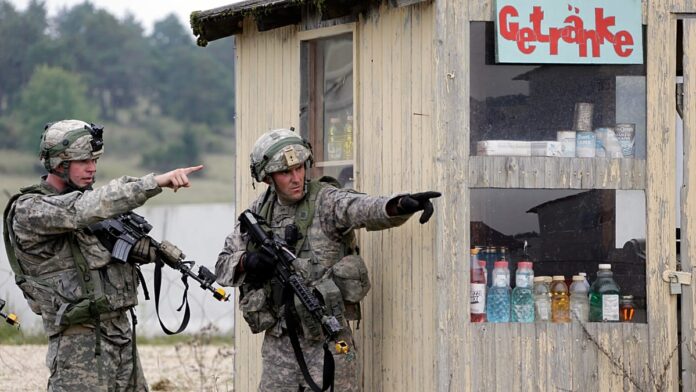US Ambassador to NATO Matthew Whitaker expressed his desire for Germany to take over NATO’s top military job, signalling a potential American retreat from European security leadership.
“I look forward to the day when Germany comes to the United States and says that we’re ready to take over the Supreme Allied Commander position” or SACEUR, Whitaker said.
He acknowledged that “we’re a long way away from that,” but added that he was nonetheless looking forward to further discussions on the subject, according to media reports.
In Whitaker’s words, Washington would like to see Europe’s military capabilities become equal to those of the US, describing this as an “aspirational goal that we should all look forward to.”
A US-based source with knowledge of the situation told Euronews that “Whitaker is someone who has traditional US views on NATO,” which makes his comments all the more surprising. However, the source added, “the Trump administration hinted about this a few months back.”
A separate source at NATO told Euronews that “the ambassadors’ comments are in line with what the Americans have said about European security being in the hands of Europeans.”
Another defence official from a NATO country said they do not see “how or why” the US would give up the role of SACEUR as it’s vital for US interests and its global influence. However, they said the US is undoubtedly pivoting away from European security.
“Giving up SACEUR would be practically very difficult”, they said.
Risks of early withdrawal amid Russia’s war
The recently leaked 28-point plan from the US and Russia, which outlined a possible end to Russia’s full-scale invasion of Ukraine, has been seen as another sign that Washington may be looking to step back from its leadership role in NATO over the longer term.
Speaking for a German TV outlet, Security expert Dr Claudia Major called the plan the “de-Americanisation of NATO”, noting that in the plan the US appears less as an active member of the alliance and more as a mediator between NATO and Russia.
A US-based source told Euronews that, “it might be hard to argue with that philosophically”, as it “could make sense”.
At the same time, the source warned that given the “volatility” and “madness” of the war in Ukraine, now is not the right moment for the US to step back from NATO.
According to German security expert and Bundeswehr University Munich professor Dr Carlo Masala, the underlying idea is that the Americans want to “gradually withdraw from their leadership role.”
“First of all, it’s important to say that this statement was forward-looking, not suggesting that Germany should take over tomorrow, but rather over a longer period,” Masala told Euronews.
A German SACEUR?
Traditionally, the role of SACEUR – in command of NATO forces in Europe – has always been held by a US general or admiral. While this is not legally required, it has long been regarded as a political and historical convention.
The current SACEUR is US Air Force General Alexus G Grynkewich, who also serves as commander of US forces in Europe.
According to Masala, the rationale for having a SACEUR coming from the Pentagon is that the role is “double-headed”, meaning the officer commands both US troops in Europe and NATO forces, including the American contingent.
According to Masala, a German – or more broadly, a European – SACEUR would no longer have command over US troops.
The US European Command currently reports around 78,000 US service personnel stationed in Europe. Last month, the number of American troops in Romania was cut from 4,000 to roughly 1,000.
Plans to reduce US forces in Europe date back to Trump’s first term. “Strangely, the number of permanently stationed troops in Germany actually went up at that time,” explained US Army officer and former commander of US forces in Europe, Ben Hodges, in an interview with Euronews.
“The administration seems more determined to go ahead with reductions,” Hodges added, explaining that what the army keeps in Europe isn’t needed in the Pacific, but could still be cut to free up money and resources.
Germany as the engine of European rearmament
Since Russia’s full-scale invasion of Ukraine and Trump’s return to office, Europe has faced a massive wave of rearmament.
Future defence spending above 1% of Germany’s GDP will be exempt from the debt brake, and from January 2026, young men will once again be subject to military conscription.
The aim is to make the Bundeswehr “combat-ready”, a goal repeatedly voiced by Germany’s Defence Minister Boris Pistorius.
Masala believes that Germany is currently the only country in Europe capable of advancing “this whole policy of arming European forces” thanks to its available financial resources.
“We are, in any case, stepping into a new military-political role,” the security expert said, though he admitted that, in his view, Berlin has “not fully grasped that yet.”
Euronews has learned that such a scenario is not currently being discussed within NATO. “We’re not discussing how it would work because it’s really not a thing,” one source said.
According to Masala, however, a German SACEUR would not help the Europeanisation of NATO “because this whole management function, which NATO carries out with regard to European forces, is largely run by the Americans.”
“That means simply changing the person at the top would achieve nothing if the Americans are gradually withdrawing from NATO, including in terms of personnel,” Masala added. A country would still be needed to replace the US, and in his view, only the UK and Germany could do so.
“Ultimately, you could say that this statement – this wish – is a bit of a look into the future. The Americans will reduce their engagement, which I think is to be expected,” Masala said.
Sources within the Lithuanian Ministry of Defence said a complete NATO withdrawal by the US is not expected, as the US would still need global influence. Nevertheless, the pressure on Europe to do more for its own defence remains.
